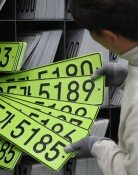Korea should not repeat the failure of preventing MERS
Korea should not repeat the failure of preventing MERS
Posted July. 09, 2015 07:18,
Health experts are warning of an outbreak of another coronavirus like MERS as it could come sooner than expected. Summer flu is spreading in Hong Kong, raising the possibility that it can be spread to Korea. The flu, Type A influenza (H3N2), had been widespread in Korea last winter. It came to an end as spring came but the flu has continued to spread in Hong Kong resulting in 563 death. Considering the attack rate and death rate, this influenza is as serious as MERS.
The World Health Organization forecasts the types of influenza that could spread every year and makes vaccines according to these estimates. Type A influenza was not included in the vaccine list last winter. This means that the WHO didn`t accurately forecast the possibility of this flu. Over 70,000 Korean people visit Hong Kong every week, raising fears that this flu could come to Korea again. The effectiveness of the vaccination has faded, and if the Hong Kong flu flows in it will result in huge human and physical damage. Thorough preparations should be made.
The number of patients infected by diseases coming from overseas stayed at around 200 people until 2009, but increased to 494 in 2013 and 388 in 2014. Due to climate change and abnormality in ecosystem, virus modification has become easy, while new infectious diseases can cross borders due to frequent air travel. During the past 40 years, more than 20 new viruses had occurred. The SARS in 2003 and swine flu in 2009 were a trigger.
Pandemic is one of the two enemies that threaten human being along with nuclear weapons. The MERS incident revealed how weak Korea`s preventive systems against infectious disease was and with many loopholes. While it was an uncontrollable thing that a person returning from Saudi Arabia was infected with MERS, the inability to prevent 186 MERS patients reflects poor initial response and lax public health systems.
At the special National Assembly MERS response committee meeting Wednesday, Health and Welfare Minister Moon Hyung-pyo admitted that the government lacked enough information and had weak preventive systems, and undervalued the spreading power of MERS. If the government gathered information of new infectious disease coming from overseas and strengthened educating health workers and travelers in advance, the situation could not have worsened. Korea`s MERS case is a human-made disaster in this regard. When MERS ends, those held responsible will have to take the consequences. However, what is more important now is to end MERS once and for all and prevent such incidents from happening again.
The government should check people returning from Hong Kong at the airport whether they have fever or are coughing. Travelers also should strictly care about personal hygiene to prevent the flu from spreading to Korea. Nonetheless, extreme fear should be guarded. The Hong Kong flu is a chance for the government to show that they really changed its preventive system.
Headline News
- N. Korea launches cyberattacks on S. Korea's defense companies
- Major university hospital professors consider a day off each week
- Italy suffers from fiscal deficits from ‘Super Bonus’ scheme
- Inter Milan secures 20th Serie A title, surpassing AC Milan
- Ruling and opposition prioritize spending amid tax revenue shortfalls







